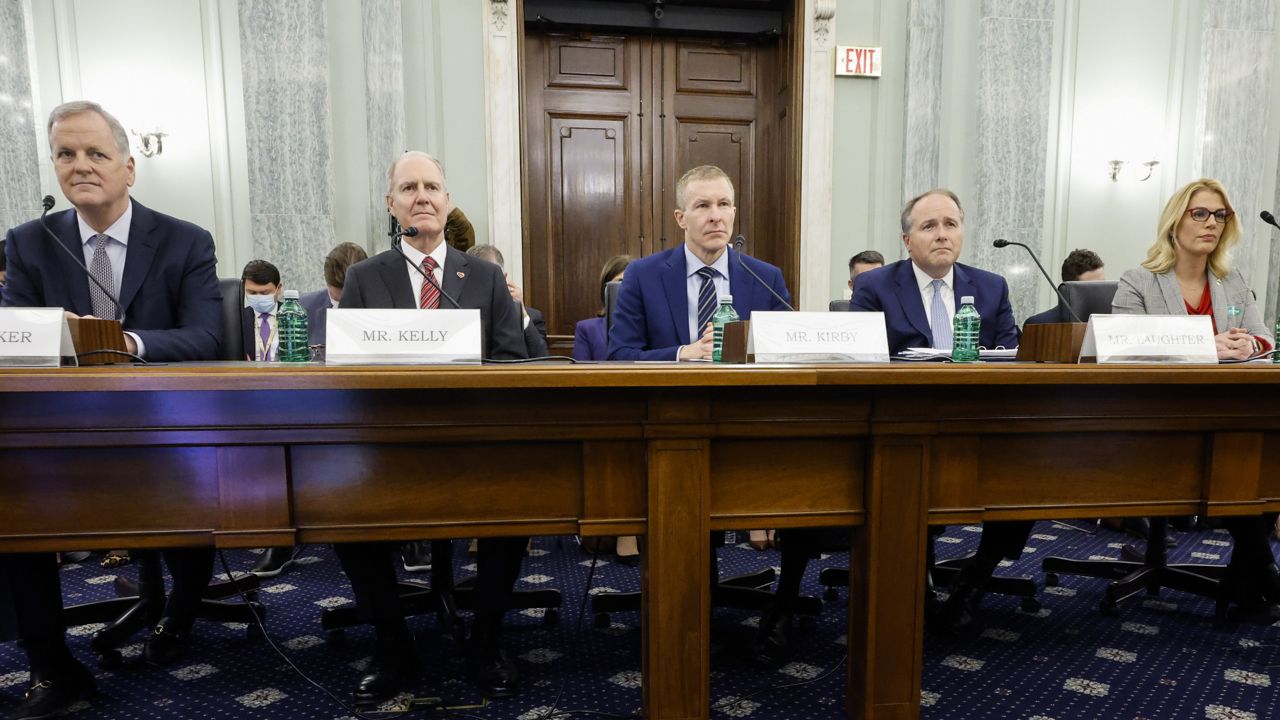Top executives from the nation’s largest air carriers appeared in front of Congress on Wednesday, facing questions on topics that ranged from protecting airline staff from volatile passengers to why so many flights have been canceled during the coronavirus pandemic.
Airlines have faced heightened scrutiny amid the coronavirus pandemic for repeated instances of canceled flights.
In June, American Airlines blamed the cancelation of hundreds of flights on labor shortages, an increase in customer demand and bad weather; in October, Southwest canceled around 2,000 flights in three days due to a bevy of issues, including executives’ claims of air-traffic control issues and bad weather.
American Airlines again canceled thousands of flights in late October, citing blustery winds at the Dallas-Fort Worth airport.
American Airlines CEO Doug Parker on Wednesday said while the company has enough staff to theoretically address such complications, they found it “difficult to get people to pick up extra time” on short notice.
“It is related to COVID, but we just don't have the ability to recover as quick,” Parker said of the amount of canceled flights. “Fortunately, those large events don't happen very often. At least for us, we had a much harder recovery than in the past.”
American Airlines plans to hire around 18,000 more employees in 2022 on top of the thousands hired this year in order to deal with a potential rebound in travel.
Senators on Wednesday pressed other executives on why mass cancelations impacted their airlines, despite the $54 billion in Payroll Support Program (PSP) funds given to their businesses.
The CEOs of Delta, United, American and Southwest Airlines largely told lawmakers that the PSP funds effectively helped their businesses stay afloat during a volatile year of travel.
“I can sum it up into words: It worked,” Southwest Airlines CEO Gary Kelly said of the PSP funds on Wednesday. “Our employees have endured unprecedented challenges over the last two years [...] They are nothing short of heroic. PSP secured their jobs and their pay and their benefits.”
Southwest used the PSP funds to pay the salaries of qualified employees, and did not cut any hours, benefits or bonuses, Kelly added. The airline was able to expand to around 18 new airports in the past 22 months with sufficient staff to service flights thanks to PSP funds.
United CEO Scott Kirby similarly said the PSP funds were “vital aid for our industry when our employees needed it most.”
Complaints against airlines skyrocketed during the pandemic, many of which came from customers who were denied refunds for canceled or delayed flights.
Parker on Wednesday said American Airlines had paid out nearly $3.2 billion in refunds this year.
Sen. Edward Markey, D-Mass., pressed Parker on whether the company would offer refunds to all passengers who canceled their reservations over COVID-19 concerns, to which Parker said customers could use vouchers to reschedule their flight for a later date. The current deadline for those nonrefundable vouchers is March 31, 2022.
Another topic that came up during Wednesday’s hearing was the increase in violence against flight staff, as the Federal Aviation Administration (FAA) has received a record number of reports of unruly passengers this year.
As of late Dec. 14, the FAA had received over 5,600 reports of unruly passengers, over 4,000 of which were due to passenger refusal to comply with the federal mask mandate on airplanes.
A number of CEOs on Wednesday suggested that mask-wearing might no longer be necessary on planes, with Kelly saying in part: “I think the case is very strong that masks do not add much, if anything, in the air cabin environment. It is very safe and high-quality compared to any other indoor setting.”
But Sara Nelson, international president of the Association of Flight Attendants, noted that not all aircraft are equipped with the same sanitation techniques and protocols, saying it is “for the medical community” to decide when to rescind the mask mandate.
“What I will tell you is we absolutely look forward to the date that we no longer have the mask requirement,” Nelson added at Wednesday's hearing.
The Associated Press contributed to this report.



